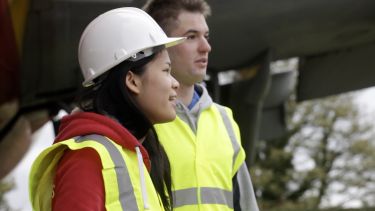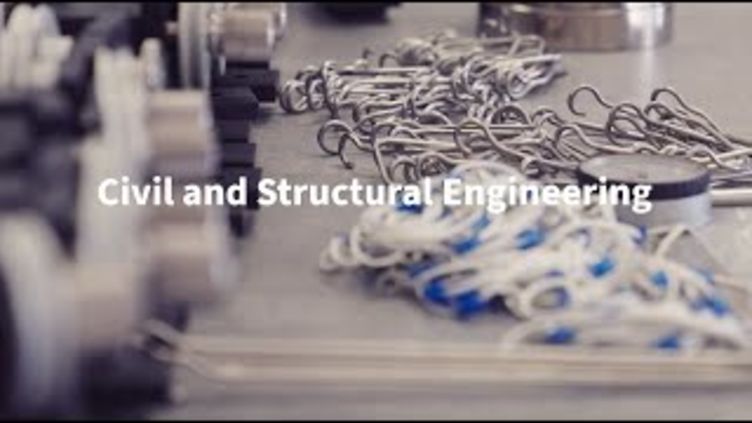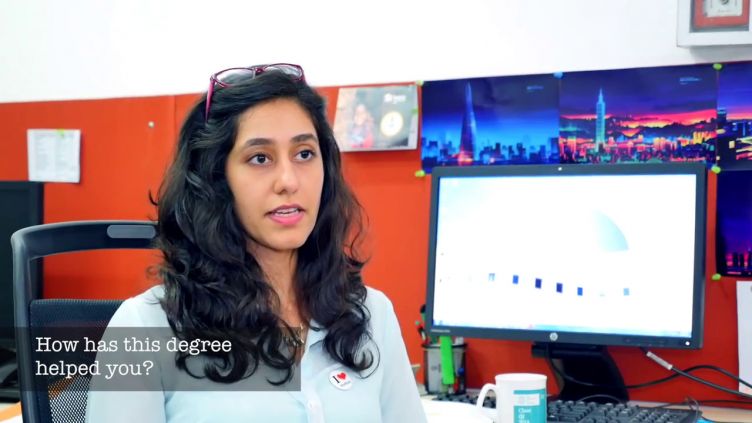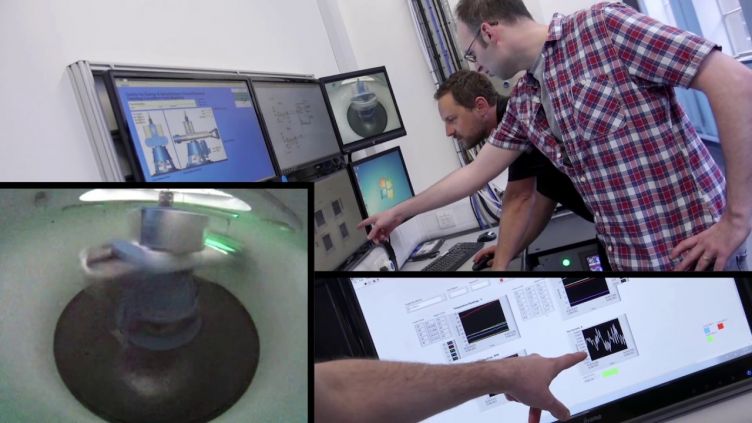Civil and Structural Engineering MEng
You'll be given a strong grounding in the core disciplines of structures, water engineering and geotechnics. The second half of the course focuses on more specialised and advanced structural engineering modules.
-
A Levels
AAA -
UCAS code
H210 -
Duration
4 years -
Start date
September
- Accredited
- Course fee
- Funding available
- Optional placement year
- Study abroad option
Explore this course:
Course description
Why study this course?
Project-based learning
Our series of design projects allows you to explore both concept and detailed design and develop capability in tackling real-world built-environment problems to address the complex challenges of engineering a low-carbon future.
World-leading researchers
You will be taught by world-leading researchers in specialist areas of civil and structural engineering, associated with challenges of infrastructure development, resilience and management in the face of climate change and natural disasters. Our school delivers unique research-led specialist modules and research projects.
A wide choice of specialism
As a large school, we offer a diverse selection of specialist research- and industry-led modules. This allows you to shape your development by selecting subjects that match your interests, and work alongside specialist academics in individual project work.
Specialist teaching facilities
'Learning by doing' is the reason The Diamond was built. Dedicated to engineering, this is where you’ll apply the theory you learn in lectures – consolidating your understanding alongside students from other disciplines, and beyond the bounds of the curriculum.
Professional skills development
Supported by a team of staff with industry experience, our programmes empower and support you to take responsibility for your own development and develop skills and attributes that prepare you for a future as a professional civil or structural engineer.

With an ethos of sustainability guiding every decision, this course develops advanced technical and multidisciplinary design skills in the principles behind civil and structural engineering, leaving your options open for a range of careers in the industry.
Research-active academics and teachers with extensive industrial experience give you a broad-base understanding in this Civil and Structural Engineering MEng with the option to specialise in your final year - making it perfect if you're not sure which area of civil engineering you want to go into.
The course integrates a strong focus on civil and structural engineering analysis and design with the latest research on sustainable development, equipping you to tackle challenges in the built environment and design innovative solutions that minimise impact on the environment.
Years one and two will see you concentrate on the core disciplines of structural engineering, water infrastructure engineering, fluid mechanics, and geotechnical engineering, from both an analysis and design perspective.
The second half of the course prepares you for your future career, extending your design experience and allowing you to specialise in those advanced topics you're passionate about. You can unleash your ingenuity and creativity on a grand scale by designing conceptual solutions for a low-environmental impact urban regeneration project, and then engineering one aspect of the project in greater detail. You’ll also develop and carry out your own research project with one of the academic staff.
The course challenges you to solve increasingly complex problems - building on your core knowledge with specialist modules in the final year so that you'll graduate as a skilled, competent and well-rounded engineer.
Accreditation
This degree is accredited by the Joint Board of Moderators (JBM) comprising the Institution of Civil Engineers, Institution of Structural Engineers, Institute of Highway Engineers, the Chartered Institution of Highways and Transportation and the Permanent Way Institution on behalf of the Engineering Council for the purposes of fully meeting the academic requirement for registration as a Chartered Engineer (CEng).

Placements and study abroad
Placement
Study abroad
More information on opportunities to study civil engineering overseas.
Modules
UCAS code: H210
Years: 2026, 2027
Core modules:
- Structural Mechanics
-
This module is delivered in both the Autumn and Spring Semesters. Teaching in the first semester is designed to provide a basis of knowledge and understanding of elastic structural analysis and will be applied to two key structural forms - trusses and beams. The focus of the second semester is on the analysis of stress, strain and elastic deformation of beams.
20 credits - Mathematics and Python Programming
-
This module aims to reinforce and extend students' previous knowledge of mathematics studied before university, and introduces the use of computer programming to solve engineering and mathematical problems.
20 credits
Mathematics is further taught to develop new basic mathematical techniques needed to support the engineering subjects taken at levels 1 and 2. It also provides a foundation for the level 2 mathematics courses in the department. Combined with the mathematics teaching, this module teaches the opensource programming language, Python, which can be used to efficiently solve a variety of practical scientific and numerical problems.
A combination of formal lecture content, tutorials and assisted computer lab sessions, help the students learn and apply mathematical and programming theory. Practice problems are presented showing the links between mathematics and programming learning, to show how the skills learnt can solve practical problems of relevance to the students. - Hydraulic Principles and Flow in Pipes
-
This module aims to build a common understanding of the principles of fluid mechanics, progressing from statics such as pressure and force on objects, through properties and laws of hydro-dynamics including continuity, energy and momentum principles of fluid in motion, leading to the ability to understand and analyse fluid flows in pipes including simple networks and the operation of pumps. Overall, you will gain the essential understanding of fluid mechanics and application to pipe flows. This will be achieved through a series of lectures, building to practical real world examples, laboratory classes and tutorial sheets. Theory is reinforced through practical experimentation and problem solving.
20 credits - Strength of Materials and Structures
-
This module focuses on materials for structural applications and covers all the main classes of materials (ceramics, metals, polymers, natural materials, and composites), describing the properties that they show, the root cause of their properties, the structure, and how we can use engineering processes to get the properties we want. The course will also introduce some ways to select the best material for a given purpose. The module also investigates how decisions made at the element and structural level alter the demands that are placed on the constituent material a structure is subjected to. For example, how the shape of an element's cross-section can change the failure mode from crushing (strength-governed) to buckling (stiffness-governed).
20 credits - Design Project 1: Make and Break
-
Get ready to shape the future and build a better world from day one! This isn't just theory; it's where you'll dive straight into solving real-life problems and see your designs come to life with tangible results. This dynamic first-year module introduces the essential knowledge and skills for 21st-century engineers. Through hands-on, interactive exercises, you'll develop critical thinking and problem-solving abilities, applying your practical maths and physics skills to real-world applications. You'll explore concepts like systems thinking and risk management, and learn from case studies of iconic projects. We'll also spark your passion for sustainability, as you learn to design and construct safe and efficient structures. You will work on exciting design challenges, and start to develop your project management skills. The highlight is a group practical project where you'll design, construct, and destructively test a physical structure.
20 credits - Design Project 2: Sustainable Buildings
-
This module is where you'll move from initial concepts to designing complex infrastructure that addresses real-world needs and shapes the built environment.
20 credits
You'll begin with an intensive, interdisciplinary design project, to find a sustainable solution to an urgent societal problem. This immersive experience will rapidly advance your teamwork, detailed design, and communication skills.
Then, you'll dive into your main task: designing an entire building and its surrounding infrastructure. You'll synthesise your first-year engineering knowledge, informed by on-the-ground measurements, historical architectural precedents, and thorough site analysis. This is about creating holistic solutions that achieve a crucial balance of social, environmental, and economic needs.
You'll communicate your vision effectively using both hand sketching and computer-aided drawing in 2D and 3D. In this module you'll learn how to make a difference in communities and shape a better future for humanity and the planet.
In your second year, you’ll continue to build your technical knowledge and skills, which you’ll apply in context within design projects.
Example core modules
- Geotechnical Engineering
- Mathematics and Applications
- Structural Analysis
- Water Engineering
- Design Projects
In your third year, you’ll enhance and refine your skills in advanced structural analysis and design, as well as consolidate your knowledge of key topics like environmental engineering and infrastructure engineering, allowing you to complete a substantial research project.
Example core modules
- Advanced Structural Design and Appraisal
- Environmental Engineering
- Infrastructure Engineering
- Research Project
In your final year, in addition to the core modules, you’ll have a wide selection of specialist optional modules, depending on your chosen specialism to suit your interests and career plans.
Example core modules
Route A: Civil and Structural Engineering
- Advanced Structural Analysis and FE Methods
- Structural Dynamics and Applications to Vibration Design
- Group Design Project
Route B: Civil Engineering
- Groundwater Engineering
- Group Design Project
Example option modules
- Parametric Modelling and Computational Design
- Reuse of Existing Structures
- Earthquake Resistant Design and Strengthening
- Geotechnical Infrastructure
- Innovations in Construction Materials and Technologies
The content of our courses is reviewed annually to make sure it's up-to-date and relevant. Individual modules are occasionally updated or withdrawn. This is in response to discoveries through our world-leading research; funding changes; professional accreditation requirements; student or employer feedback; outcomes of reviews; and variations in staff or student numbers. In the event of any change we will inform students and take reasonable steps to minimise disruption.
Learning and assessment
Learning
We take a practical 'learn by doing' approach which puts engineering practice at its core. You will work in state-of-the-art facilities using the same equipment, computer modelling and simulation software found in the workplace.
You will learn to think like an engineer by solving real industry challenges. Your learning will include:
- lectures and tutorials: to build your core knowledge
- practical lab sessions and design classes: hands-on activities in our state-of-the-art facilities to apply your knowledge to real engineering problems
- computer modelling and simulation: using industry-standard software
- project work: where you will learn important group work skills and have the opportunity to work with industry partners to solve real-world problems
- an individual investigative project: where you organise and conduct your own research, showcasing your ability to work independently.
As well as your formal timetabled sessions, you will be expected to manage your own time and undertake independent study. To support this, you will have 24/7 access to our online library service and various study spaces designed for both individual work and group collaboration.
Assessment
We use a wide range of assessments designed to match the specific skills you are developing in each module, ensuring they mirror the tasks that you’ll face in your engineering career. Depending upon your module choices, you can expect a mix of:
- coursework: including reports, presentations, posters and a wide range of other formats used by engineers to communicate information
- practical work: assessing your hands-on capability to meet complex engineering challenges
- exams: written examinations and online assessments.
This variety ensures you’ll graduate with a range of both engineering and professional skills, ready to present ideas, write professional reports and solve industrial problems - exactly what you’ll need in your future career.
Entry requirements
With Access Sheffield, you could qualify for additional consideration or an alternative offer - find out if you're eligible.
The A Level entry requirements for this course are:
AAA
including Maths
- A Levels + a fourth Level 3 qualification
- AAB, including A in Maths + A in a relevant EPQ; AAB, including Maths + A in AS or B in A Level Further Maths
- International Baccalaureate
- 36, with 6 in Higher Level Maths; 34, with 6 in Higher Level Maths, and A in a science-based extended essay
- BTEC Extended Diploma
- DDD in Engineering + A in A Level Maths
- BTEC Diploma
- DD in Engineering + A in A Level Maths
- T Level
- Not accepted
- Scottish Highers + Advanced Higher/s
- AAAAB + A in Maths
- Welsh Baccalaureate + 2 A Levels
- A + AA, including Maths
- Access to HE Diploma
- Award of the Access to HE Diploma in a relevant subject, with 45 credits at Level 3, including 39 at Distinction (to include Maths and Science or Engineering units) and 6 at Merit + A in A Level Maths
-
GCSE Physics (or Combined Science) grade 6/B
-
Acceptable Maths subjects include Maths, Maths with Mechanics, Further Maths or Applied Maths, but not Statistics or Use of Maths. Pure Maths is only acceptable when combined with Physics
The A Level entry requirements for this course are:
AAB
including Maths
- A Levels + a fourth Level 3 qualification
- AAB, including A in Maths + A in a relevant EPQ; AAB, including Maths + A in AS or B in A Level Further Maths
- International Baccalaureate
- 34, with 5 in Higher Level Maths
- BTEC Extended Diploma
- DDD in Engineering + B in A Level Maths
- BTEC Diploma
- DD in Engineering + B in A Level Maths
- T Level
- Not accepted
- Scottish Highers + Advanced Higher/s
- AAABB + B in Maths
- Welsh Baccalaureate + 2 A Levels
- B + AA, including Maths
- Access to HE Diploma
- Award of the Access to HE Diploma in a relevant subject, with 45 credits at Level 3, including 36 at Distinction (to include Maths and Science or Engineering units) and 9 at Merit + A in A Level Maths
-
GCSE Physics (or Combined Science) grade 6/B
-
Acceptable Maths subjects include Maths, Maths with Mechanics, Further Maths or Applied Maths, but not Statistics or Use of Maths. Pure Maths is only acceptable when combined with Physics
You must demonstrate that your English is good enough for you to successfully complete your course. For this course we require: GCSE English Language at grade 4/C; IELTS grade of 6.5 with a minimum of 6.0 in each component; or an alternative acceptable English language qualification
Equivalent English language qualifications
Visa and immigration requirements
Other qualifications | UK and EU/international
If you have any questions about entry requirements, please contact the school.
Graduate careers
School of Mechanical, Aerospace and Civil Engineering
Our graduates work all over the world, from the UK to Australia and the USA. Recent graduates have gone on to work for AECOM, Arup, Atkins, Buro Happold, Eastwood & Partners, and Kier.
You'll be able to apply your knowledge and skills to fields as diverse as the built environment, sustainability and improving the environment.
In addition, architectural engineering graduates might go into a broad range of engineering areas ranging from building services to mechanical, electrical or acoustic engineering.
Or as a structural engineer, you'll be helping to shape the world around us. Structural engineers design and construct multi-storey buildings, bridges, sports stadiums, tunnels, airports and schools.
School of Mechanical, Aerospace and Civil Engineering
Department statistics
UK top 10 for civil engineering
The Times and The Sunday Times Good University Guide (by subject) 2025
6th in the UK for civil engineering
The Guardian University Guide 2026
96% of our research is rated world-leading or internationally excellent
Research Excellence Framework (REF2021)
As part of a world top-100 university and a leader in excellent student experience, our school brings together expertise from across the mechanical, aerospace and civil engineering disciplines to help you create a better future. Whether you want to design sustainable transport, build resilient cities, or pioneer new technologies, we provide innovative teaching and practical experience to help you get there. And we inspire and empower our researchers and students to solve the challenges of today and tomorrow.
At Sheffield, we believe in learning by doing and our courses are designed to give you both the academic knowledge and practical experience that employers look for. You’ll take part in projects where you’ll connect engineering theory to practice, including our interdisciplinary Global Engineering Challenge and Engineering You’re Hired project weeks where you get to solve real-world problems alongside other student engineers. There’s also the opportunity to join our student-led engineering teams, building everything from single-seat racing cars, rockets and miniature locomotives, to sustainable wind turbines and human-powered aircraft.
From day one, you’ll be immersed in a research-led curriculum, taught by academics who are experts in their fields, with a wealth of experience, many involved in the latest engineering research. You'll also have the opportunity to work with our industrial partners, giving you experience that will support your employability. You’ll have an academic personal tutor who will support and guide your progress throughout your studies.
You'll be taught in The Diamond, one of the best teaching spaces in the UK.
Facilities
Our students connect engineering theory to practice in The Diamond, developing the skills, knowledge and experience that global employers demand.
The Diamond features some of the best engineering teaching spaces in the UK. You’ll be taught in specialist state-of-the-art teaching and dedicated lab facilities such as our structures and dynamics lab, fluids engineering lab, and our thermodynamics and mechanics lab. This means you'll directly apply what you’ve learnt in lectures to lab sessions helping you to put theory into practice.
Alongside teaching and study spaces, the Diamond is also home to iForge – the UK's first student-led makerspace.
University rankings
A world top-100 university
QS World University Rankings 2026 (92nd)
Number one in the Russell Group (based on aggregate responses)
National Student Survey 2025
92 per cent of our research is rated as world-leading or internationally excellent
Research Excellence Framework 2021
University of the Year for Student Experience
The Times and The Sunday Times Good University Guide 2026
Number one Students' Union in the UK
Whatuni Student Choice Awards 2024, 2023, 2022, 2020, 2019, 2018, 2017
Number one for Students' Union
StudentCrowd 2025 University Awards
20th in the UK targeted by the largest number of Top 100 Employers in 2025-26
High Fliers 2026
Student profiles
I love staying busy and I can’t imagine spending my time at university any better!
Anna
International student,
MEng Civil and Structural Engineering
Fees and funding
Fees
Additional costs
The annual fee for your course includes a number of items in addition to your tuition. If an item or activity is classed as a compulsory element for your course, it will normally be included in your tuition fee. There are also other costs which you may need to consider.
Funding your study
Depending on your circumstances, you may qualify for a bursary, scholarship or loan to help fund your study and enhance your learning experience.
Use our Student Funding Calculator to work out what you’re eligible for.
Visit
University open days
We host five open days each year, usually in June, July, September, October and November. You can talk to staff and students, tour the campus and see inside the accommodation.
Online events
Join our weekly Sheffield Live online sessions to find out more about different aspects of University life.
Subject tasters
If you’re considering your post-16 options, our interactive subject tasters are for you. There are a wide range of subjects to choose from and you can attend sessions online or on campus.
Offer holder days
If you've received an offer to study with us, we'll invite you to one of our offer holder days, which take place between February and April. These open days have a strong department focus and give you the chance to really explore student life here, even if you've visited us before.
Campus tours
Our weekly guided tours show you what Sheffield has to offer - both on campus and beyond. You can extend your visit with tours of our city, accommodation or sport facilities.
Apply
The awarding body for this course is the University of Sheffield.
Recognition of professional qualifications: from 1 January 2021, in order to have any UK professional qualifications recognised for work in an EU country across a number of regulated and other professions you need to apply to the host country for recognition. Read information from the UK government and the EU Regulated Professions Database.
Any supervisors and research areas listed are indicative and may change before the start of the course.




